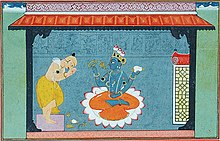Chatuh Shloki
| Chatuh Shloki | |
|---|---|
 Painting of Lakshmi (centre right) and her consort Vishnu (centre left), venerated in this work. Ravi Varma Press | |
| Information | |
| Religion | Hinduism |
| Author | Yamunacharya |
| Language | Sanskrit |
| Verses | 4 |
The Chatuh Shloki (Sanskrit: चतुःश्लोकी, romanized: Catuḥślokī) is a Sanskrit hymn by the Hindu philosopher Yamunacharya of the Sri Vaishnava tradition.[1] Comprising four verses,[2] the Chatuh Shloki extols Lakshmi, the consort of the deity Vishnu.[3]
Etymology
Chatuh Shloki is Sanskrit for "four verses".[4]
Description
The four stanzas of the work describe the various attributes of the goddess Lakshmi, her greatness and mercy, the grace she offers to her devotees, and her inseparability in form from her consort Vishnu (Lakshmi Narayana) respectively.[5] Lakshmi is represented as an intermediary between a devotee and Vishnu; she is described to present a devotee's piety to her consort, offering her consort's grace to the devotee in turn. The work is regarded to be a pioneer in offering descriptions of the personality of the goddess and her relationship with a devotee and her consort in Vaishnava philosophy.[6]
Hymn
| Part of a series on |
| Vaishnavism |
|---|
 |
The first stanza of the hymn describes the attributes of Lakshmi and her standing among other beings:[7][8]
kāntaste puruṣottamaḥ phaṇipatiḥ-śayanāsanam vāhanaṁ
vedātmā vihageśvaro yavanikā māyā jaganmohinī
brahmeśādi-suravrajaḥ sadayitas tvaddāsa-dāsīgaṇaḥ
śrīrityeva ca nāma te bhagavati brūmaḥ kathaṁ tvām vayam
Purushottama (an epithet of Vishnu) (is) your consort; the lord of the serpents (Shesha) (is) your throne; the king of the birds, (Garuda) whose body the Vedas are, (is) your mount; Maya (illusion), the world-enchantress (is) your veil; all the hosts of the devas with their consorts (are) your retinue of attendants and maids. Your name itself is Sri (prosperity). (Possessed of all this greatness, as you are), how can we (adequately) sing your praise?
— Chatuh Shloki, Verse 1
See also
References
- ^ Hinnells, John R. (1991-12-12). Who's Who of World Religions. Springer. p. 447. ISBN 978-1-349-09500-1.
- ^ A History Of Indian Philosophy Vol-iii (1940). The University Press Cambridge. 1940. p. 99.
- ^ Williams, Raymond Brady; Trivedi, Yogi (2016-05-12). Swaminarayan Hinduism: Tradition, Adaptation, and Identity. Oxford University Press. p. 149. ISBN 978-0-19-908959-8.
- ^ Hawley, John Stratton; Wulff, Donna Marie (July 1996). Devi: Goddesses of India. University of California Press. p. 106. ISBN 978-0-520-20058-6.
- ^ Yamunacharya. Complete Works Of Yamunacharya (English). p. 358.
- ^ Chatterji, Suniti Kumar (1937). Cultural Heritage Of India Vol.5. p. 120.
- ^ Śrī Rāmānuja Vāṇī A Quarterly Journal of Viśiśtādvaita Vedānta. Vol. 26. Ṡrī Rāmānuja Vedānta Centre. 2003. p. 47.
- ^ Yamunacharya. Complete Works Of Yamunacharya (English). p. 358.
